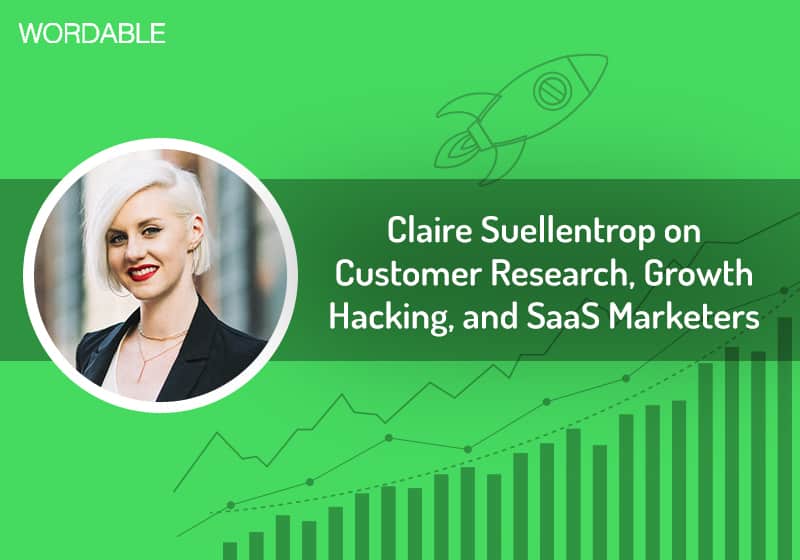
Content Crafters is an interview series where we de-construct the tools, tips, and tactics that top bloggers use to get so much work done. you’ll walk away in mere minutes with actionable takeaways you can try out right away. Let’s dive in!
Claire Suellentrop is a SaaS Marketing & Growth Advisor. Currently, she runs Elevate, a consultancy that helps SaaS companies grow faster and smarter. She’s also the co-founder of both Forget The Funnel and UserList.io.
Forget The Funnel is an online workshop series and training program that helps early-career SaaS marketers become respected leaders (and, in turn, help their company succeed). UserList.io is a a customer messaging tool for SaaS companies.
Previously, she was the Director of Marketing at Calendly.
In her work and writing, Claire focuses heavily on customer insights and research as well as sustainable full-funnel growth. We’ll cover these topics and more in the interview below.
You can find Claire on Twitter at @ClaireSuellen or on her website here.

Oh boy, buckle your seatbelt…
Like many SaaS marketers, I entered the field through the “writing” door. I’ve always had a penchant for writing — particularly for documenting the stories of people / events. At first, I thought this would put me on the path to a journalism career, so I went from newspaper writer in high school, to working at the campus radio station in college.
Working in radio landed me my first ‘adult’ job at an entertainment marketing agency. It sounded glamorous to 22-year-old me (all the free concert tickets you could want!) but it was grueling in reality: long hours at the office, followed by long evenings wining & dining clients, and after that most nights, going to shows of the musicians my agency represented. I’d regularly get home most nights between 12-2am, and be at my desk again by 9am. So during that time, I started a food blog (like seemingly everyone did around 2011), called Eat Well. Party Hard., where I documented my tricks for eating healthfully while living this run-you-ragged lifestyle.
**Remember the blog, it comes back into the story later.
After a while, I knew I didn’t want to build my career in entertainment marketing — but had no idea what industry I did want to build a career in. I was also terrified at the possibility of jumping into another job out of desperation, only to find it no better than the one I had. So I put in my notice, packed my bags, and moved to a small town in China, where I spent a year teaching English.
While living in China, I kept the blog running. It became my sandbox for learning to make money on the internet: I wrote my first ebook and actually sold quite a few copies, then I started getting consulting requests through the blog, too! Suddenly, I found myself facing the complex task of booking video calls with consulting clients in America, while living on the other side of the globe.
A couple Google searches later, and I stumbled across this cool scheduling tool called Calendly.

At that time, Calendly was in free open beta. So shortly after signing up, I received one of those standard customer development emails — something like Welcome to Calendly, what led you to sign up today? Do you need help or have any questions? I actually replied to explain what I needed the product for, and asked a few questions re: features I needed for my use case. To my surprise, the founder sent a helpful response back. He also ended up subscribing to my blog newsletter via the link in my signature; as a result, he got a sense of my writing style — how I might weave a lesson into an interesting story, how I’d break down a complex concept into manageable steps, etc.
When I returned to the States a few months later, he sent me another email to let me know that the company was seeking its first marketing hire — and that he’d like me to apply. Thus began my entry into SaaS marketing.
Since then, I’ve gone on to help many other incredible companies increase the effectiveness of their marketing. FullStory, Wistia, Edgar, and Death To The Stock Photo were particular delights to work with.
What’s the value? Whew, we could go in so many directions with this. For me personally, the greatest value has been a) career growth and b) the ability to positively impact fellow SaaS marketers’ lives at scale.
On career growth: in the words of Marian Wright Edelman, “You can’t be what you can’t see,” and I’ve found this to be true.
The more my goofy food blog grew, the more new people I met and the more new ideas I was exposed to. As a result, I was eventually granted the opportunity to launch a new career in an industry I love — one that, as recently as 10 years ago, I hadn’t even heard of.
On positively impacting others at scale: co-founding Forget The Funnel with my business partner Georgiana Laudi has expanded our network of SaaS marketers and founders to thousands of people, and it’s shown us how badly coaching & more formalized training are needed by marketers at SaaS companies. Recognizing this need has allowed us to launch SaaS Marketer Essentials — through which we’ve helped hundreds of marketers establish themselves as strategic leaders within their companies, make a bigger impact on their companies’ revenue, and even negotiate promotions + raises. Pretty awesome.
Looking back, part of the reason we picked that name was that Gia had already registered the domain and was waiting for the right project to use it on — ha!
But to get real, “Forget The Funnel” speaks to Gia’s + my shared philosophy that marketing isn’t really a “funnel.”
It doesn’t end when a new customer is acquired.
Rather, marketing should play a part in keeping every step of the customer journey consistently valuable and helpful.
People seem to want to call this “growth” now. I look at “marketing” and “growth” as two terms for the same activity: finding opportunities at every stage of the customer journey to make the customer more successful — and therefore to increase revenue.
Is growth “hacking” dead yet? crosses fingers
For the record: to me, a growth “hack” implies that a particular tactic is more of a trick to generate more revenue, and less delivery of value to the customer to generate more revenue.
For example, my friend Joel (a brilliant marketer) recently tweeted about this horrible “growth hack” idea he found: if you have a user whose free trial ended and whose card was charged, but they’d like a refund, ask them to first connect you with 3 people in their network who might be interested in your product before processing their refund.
Like, WTF? That’s just gross.

Getting on the phone for about 10 customer interviews before embarking on a conversion rate optimization or content creation project. You’ll go into it with SUCH a better idea of who you’re trying to speak to, what matters to them, and how they naturally communicate (their real words, their real phrases). As a result, your work will be 10x more effective than if you’d just brainstormed a bunch of ideas in a conference room.
No joke — every time I’ve helped a company improve the effectiveness of their marketing, we start with customer research to inform our decisions. Most recently, I worked with a really cool company called Autobooks to improve their lead > product signup rate. We knocked it outta the park together, and there’s no way we would have been as impactful without talking to customers first.
Thankfully, customer research is starting to become a more accepted necessity in marketing. As the era of “hacking” starts to fade, and as delivering customers value to generate growth becomes more & more the norm, it becomes that much more obvious that every department needs a deep understanding of, and empathy for, the customer. This includes marketing, sales, product, and engineering — not just the customer success & support teams handling help desk tickets.
We’re not 100% of the way there yet, but there are definitely more marketers talking about the importance of customer research than there were even five years ago. Katelyn Bourgoin and Alli Blum are a few of my faves.
This is a tough question, because there are SO MANY fascinating life paths out there. I get analysis paralysis just thinking about all the options. I guess I’d have to break it down by motivations. For example, if my main motivation was…
¯\(ツ)/¯ ¯\(ツ)/¯
Gimme three tips to improve my writing? (What can anyone do to be a better content/copywriter)